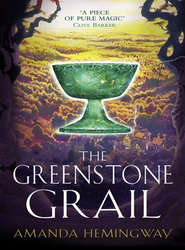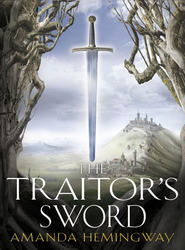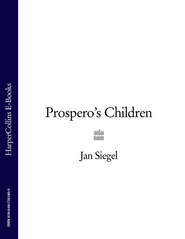По всем вопросам обращайтесь на: info@litportal.ru
(©) 2003-2024.
✖
The Poisoned Crown: The Sangreal Trilogy Three
Автор
Год написания книги
2018
Настройки чтения
Размер шрифта
Высота строк
Поля
‘Something’s scared you. You look done in.’
He wasn’t going to tell her about his fear of the water. ‘I’m okay,’ he assured her. ‘Just trying to figure out what’s going on.’
‘Can I help?’
‘Maybe.’ He hesitated. ‘How much do you know about the water-spirit who was after the Grail?’
Annie tensed, her nebulous fears returning like bats to their cave. ‘Do you think she had something to do with your accident?’
‘No. No, not that. But I’ve been to this place – Widewater – it’s all sea, a whole planet with nothing but sea. There was land once but it was overwhelmed. She devoured it. She hates all creatures of the air – lungbreathers – even whales and selkies. They call her the Goddess, the Queen of the Sea – the Grandir said her name was Nefanu. She seems to have some connection with the water-spirit here. Like an alter ego – a more powerful twin. And more evil.’
‘A Doppelganger,’ Annie said promptly. ‘I know. The theory is we all have other selves in other worlds, living out alternative lives.’
‘It’s something I’ve come across before, in a way,’ Nathan said. ‘Not exactly other selves but … parallels. The same stories running through every world, the same kind of people. Like, Nell always reminded me of Hazel – a mediaeval, princessly Hazel, much prettier and a bit spoiled—’
‘Don’t ever tell her that,’ Annie said hastily.
‘D’you think she’d mind?’ Nathan sounded a little surprised.
‘The phrase “much prettier” isn’t good. About this goddess—?’
‘This is different. The link seems to be much closer – as if the spirit in this world knows her counterpart is out there, and wants to reach her, to bond with her. That’s why she wants the Grail – and me. Or so the Grandir said.’
‘You’ve talked with him?’ Belatedly, Annie was picking up on the implications. More bats came home to roost.
‘Yes – but only briefly. He says he’s helping me, or guiding me, but he never answers my questions. Not the really vital ones.’
Annie asked, very carefully: ‘What kind of a – a being is he?’
‘Human.’ Nathan was startled. ‘Like Eric, only taller. Big shoulders. He makes you feel … like he’s huge, not so much
physically but his personality, his mind. His aura. He has the kind of vibes that fill up all the available space. He could talk to a crowd of millions, and every single person there would think and feel exactly what he wanted them to think and feel. And he wouldn’t even be trying: it would just happen. That’s how he is. Huge inside. It’s difficult to describe …’ He was running out of metaphors, gazing intently at Annie in an attempt to convey some impression of the man who had ruled a cosmos – who had laid an ungloved hand on his forehead, and stroked his hair. For a minute, he thought his mother had gone deadly pale. The way she might have looked if a raven had flown into the room and perched on the bedstead, croaking: Nevermore—
(And my soul from out that shadow that lies floating on the floor
Shall be lifted
Nevermore!)
—but he concluded it was a mere quirk of fancy, a footstep on his grave, that was all. The bleak winter daylight made everyone look grey and cold.
He said: ‘Mum …?’
‘Sorry,’ Annie said. ‘I was … wool-gathering. The goddess – what did you call her? Nefanu. Nefanu – and Nenufar. That’s almost an anagram. It can’t be coincidence.’
‘I hadn’t thought of that. D’you suppose she’s still around – Nenufar, I mean?’
‘I don’t know,’ Annie said, but her expression gave the lie to her words.
She knew.
At Ffylde, the blame-chain had reached the headmaster. He had been in the job for less than a year, after his predecessor, the abbot, had left for higher things. Unlike Father Crowley he was a layman, who talked managementspeak and prided himself on his ability to bond with the boys, especially those with the wealthiest and most influential parents. Right now his main concern was that Nathan’s accident had occurred in the absence of the games master, laying the school open to possible charges of negligence. It was therefore imperative that blame – like the baton in a relay race – was passed on to someone else. The only question was whom. After interviewing Rix, sympathetically and at length, he talked to the other witnesses.
‘I gather Nathan was – hrmm! – showing off,’ he suggested.
Ned Gable said flatly: ‘No. Nathan never shows off. He isn’t like that.’
And, baring his chest for the knife: ‘It was my fault. I was the one who … I should’ve done the dive, but I couldn’t because of my ankle. So Nathan had to.’
‘Very fine of you,’ the headmaster said indulgently, ‘standing up for your friend, but you can’t take responsibility for his actions. That will be all.’
‘Sir—’
‘That will be all.’
The other boys received the headmaster’s suggestion with variations on a blank gaze and stony silence. Father Crowley would have known how to elicit the true facts, but the new head had neither his piercing eye nor his uncanny omniscience, and was only too ready to take that silence for assent. In the classroom omertà was the rule of the day: none of the boys would point the finger at Rix in front of an adult, whatever their private feelings – that would be the behaviour of a supergrass. However, many of them resolved secretly that on the rugger pitch they would make him pay.
All of which did Nathan no good at all.
‘The boys shouldn’t have been left unsupervised,’ the head told their form master, Brother Colvin. ‘That goes without saying. We can only hope the Ward woman won’t get herself an unscrupulous lawyer – that could cause us a lot of trouble.’
‘Mrs Ward,’ said Brother Colvin, laying some emphasis on the title, ‘is a very sweet person who would never dream of doing such a thing. A year or so ago Nathan had a problem with Damon Hackforth – he was a bit of a delinquent, we’d had a lot of problems with him – and Annie was quite amazingly kind and understanding about it. The whole business could have been very serious, both for the Hackforths and the school. If she hadn’t shown truly Christian forbearance …’
‘I see,’ said the headmaster. ‘I hadn’t realised Nathan had a track record as a troublemaker.’
‘Nathan wasn’t the one making trouble,’ Brother Colvin said. ‘I told you—’
‘No, no, Brother, say no more. He never makes trouble, he’s just caught up in it. That’s the danger with these scholarship boys: we all feel obliged to bend over backwards for them, no matter how badly they behave. They come to us from questionable homes – I gather Mrs Ward is a single parent – no discipline, no moral standards, and they’re thrown in the midst of decent kids from good families, and thanks to political correctness we have to make heroes of them. Well, I won’t have it. I infer Nathan fancies himself as a “tough guy” – he’d probably call himself streetsmart – and that sets a very poor example to the others. And word gets around, believe me. Many parents of prospective pupils could be discouraged by that sort of thing. I intend to see that Nathan’s scholarship entitlement for next year is going to be reconsidered.’
‘He’s very bright,’ Brother Colvin pointed out with deceptive mildness. ‘His results make an important contribution to our position in the league tables.’
‘Well, well. We’ll see. Perhaps Mrs Ward may be offered some kind of subsidy, providing she can come up with the bulk of the fees. This is a prestige establishment, not a charity school. I see no reason why she should freeload when other parents are prepared to dig into their pockets – often to make sacrifices – for their children’s welfare.’
Brother Colvin blinked. He wondered fleetingly what sacrifices bankers, stockbrokers and oil millionaires had to make to pay for their sons’ education. Living half the year in a tax haven, perhaps?
He said, still fighting his corner: ‘Nathan’s also an accomplished athlete. He’s on the school team for both rugby and cricket.’
‘No doubt,’ said the head, with a thin smile. ‘I don’t believe in favouring a boy for such reasons. This isn’t Cambridge, where they tolerate almost anything if a student can wield an oar.’ In his youth, he had been turned down for Magdalene, and still bore a grudge.
‘Father Crowley had a very high opinion of Nathan,’ Brother Colvin persisted.
A tactical error.
‘Father Crowley,’ said the head loftily, ‘was, I am sure, a naïve and trusting soul, as befits a man of the cloth. I, alas, am expected to take a more worldly view. The governors installed me as his successor since they needed someone with secular experience and the people skills that come from a life lived in the rough-and-tumble of the wider world.’ (He’s quoting from the speech he made when he first came here, Brother Colvin thought with a sinking heart.) ‘Trust me: I understand these boys. I can sense a bad apple even before I bite into it. Besides,’ he added, obscurely, ‘we have a good ethnic mix here.’ Belatedly, Brother Colvin realised this was a reference to Nathan’s dark complexion. ‘Think of Aly al-Haroun O’Neill – Charles Mokkajee – just the sort of pupils we need.’
‘If the corruption charges against Mr Mokkajee senior stick,’ Brother Colvin said rather tartly, ‘he’ll be spending a long time in a Bombay jail. Hardly the most desirable parent.’
‘Now, now,’ said the head, with a tolerant smile. ‘He’s innocent until proven guilty: we mustn’t forget that. Anyhow, I gather the case will be bogged down in the Indian legal system for some years. And by the way, it’s Mumbai, not Bombay. We don’t want to offend Charles’ ethnic sensibilities, do we?’










